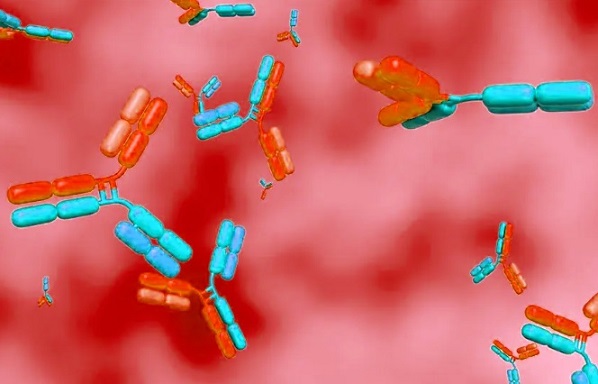More Than 50 Percent of Individuals Exposed to COVID-19 Will Develop Antiphospholipid Autoantibodies!
Nikhil Prasad Fact checked by:Thailand Medical News Team Feb 04, 2025 2 months, 1 week, 2 days, 9 hours, 51 minutes ago
Medical News: A Growing Concern in COVID-19 Research
As the world continues to study the long-term effects of COVID-19, scientists are uncovering more about how the virus impacts the human body. One important discovery is the potential role of antiphospholipid antibodies (aPLs) in COVID-19 patients. These antibodies are known to cause excessive blood clotting, which can lead to serious health problems.
 More Than 50 Percent of Individuals Exposed to COVID-19 Will Develop Antiphospholipid Autoantibodies!
More Than 50 Percent of Individuals Exposed to COVID-19 Will Develop Antiphospholipid Autoantibodies!
A recent systematic review conducted by researchers from Shahid Beheshti University of Medical Sciences in Iran, Istituti Clinici Scientifici Maugeri IRCCS in Italy, the University of Sassari in Italy, and the Public Health Consulting Group in Switzerland sheds light on how aPLs might contribute to blood clotting disorders in COVID-19 patients. This
Medical News report examines their findings and what they mean for patient care.
Understanding Antiphospholipid Antibodies
Antiphospholipid antibodies are autoantibodies, meaning they mistakenly attack the body’s own cells. They specifically target phospholipid-binding proteins, which play a key role in blood clotting. In people with high levels of these antibodies, the risk of developing blood clots increases significantly. This can lead to conditions like deep vein thrombosis, pulmonary embolism, and strokes.
The study reviewed 59 different research papers covering a total of 28,489 COVID-19 patients, of which 14,498 had been tested for aPLs. It found that 50.84% of these tested patients had positive results for aPLs. This suggests a strong connection between COVID-19 and an increased likelihood of developing these dangerous antibodies.
How Antiphospholipid Antibodies Affect COVID-19 Patients
The presence of aPLs in COVID-19 patients is a major concern because it significantly increases the risk of life-threatening blood clots. The review showed that among COVID-19 patients who developed thrombosis (blood clots), 38.55% tested positive for aPLs. This suggests that these antibodies could be playing a role in worsening the severity of the disease.
Different types of aPLs were found in COVID-19 patients, including anticardiolipin (IgG, IgM, IgA), anti-beta2 glycoprotein (IgG, IgM), and lupus anticoagulant antibodies. Notably, lupus anticoagulant was found in 17.2% of patients with thrombosis. These findings indicate that COVID-19 patients with aPLs may require special medical attention to prevent severe complications.
Treatment Approaches for Affected Patients
Due to the potential link between aPLs and severe COVID-19 cases, treatment strategies need to consider anticoagulation therapy. The study found that 55.83% of the patients received heparin or enoxaparin, which are common blood-thinning medications. These treatments help reduce the risk of clot formation and improve patient outcomes.
Additionally, patients who tested positive for aPLs had
a higher need for intensive care, intubation, and longer hospital stays. While 19.65% of COVID-19 patients without aPLs required ICU admission, this number jumped to 35.17% among those with aPLs. Similarly, 29.55% of aPL-positive patients required intubation compared to 14.69% in the aPL-negative group. This further supports the idea that aPLs may contribute to the severity of COVID-19 infections.
What These Findings Mean for the Future
The connection between aPLs and COVID-19 highlights the importance of screening for these antibodies in hospitalized patients. Early detection could help doctors identify those at higher risk for blood clots and implement preventive measures. Furthermore, this study raises questions about the long-term effects of aPLs in COVID-19 survivors. Some researchers believe that aPLs may contribute to post-COVID complications such as chronic blood clotting disorders and autoimmune diseases.
However, more research is needed to fully understand how COVID-19 triggers the production of these antibodies and whether they are temporary or long-lasting. Standardized testing and larger studies could provide clearer answers and improve treatment options for affected patients.
Conclusion
This study offers crucial insights into the potential dangers of antiphospholipid antibodies in COVID-19 patients. With more than half of tested patients showing positive results for aPLs, there is a strong possibility that these antibodies play a significant role in COVID-19-related complications. The findings suggest that COVID-19 patients should be monitored for aPLs, especially those who develop blood clotting issues. Early intervention with anticoagulation therapy may help reduce the risk of severe outcomes.
As the medical community continues to learn more about COVID-19 and its effects on the body, studies like this provide valuable guidance for healthcare providers. More research will be needed to determine the best treatment approaches and to understand the long-term impact of aPLs in COVID-19 survivors.
The study findings were published in the peer-reviewed journal: Immunity, Inflammation, and Disease.
https://onlinelibrary.wiley.com/doi/10.1002/iid3.70134
For the latest COVID-19 News, keep on logging to Thailand
Medical News.
Read Also:
https://www.thailandmedical.news/news/study-shows-that-individuals-who-have-recovered-from-covid-19-are-more-likely-to-develop-antinuclear-antibodies
https://www.thailandmedical.news/news/covid-19-induces-expression-of-autoantibodies-targeting-proteins-linked-to-rheumatologic-and-neurologic-functions
https://www.thailandmedical.news/news/a-clinical-overview-of-antiphospholipid-syndrome
